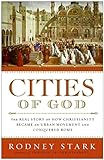Cities of God

Plunged into Cities of God by Rodney Stark this morning. Three insights on church planting movements from first chapter:
1. No mission without monotheism
The Jews were the world’s first missionaries because Judaism was monotheistic. Paganism doesn’t produce missionary movements. Within a polytheistic framework, new gods are supplements not alternatives.
The Jews of the Diaspora were very successful in seeking converts. By the first century, Jews made up from 10-15% of the population of the Roman Empire, nearly 90% of them lived cities outside Palestine— that's six to nine million people.
Christianity was even more successful in evangelism because Christians didn’t have to become ethnic Jews. Christianity offered the world monotheism stripped of ethnic encumbrances.
2. Conversion is adopting the faith of your friends
Conversion is primarily about bringing one’s religious behavior into alignment with that of one’s friends and relatives, not about encountering attractive doctrines. After conversion has occurred is when most people get more deeply involved in the doctrines of their new group.
Most conversions are not produced by professional missionaries conveying a new message, but by rank-and-file members who share their faith with their friends and relatives..
3. Why early Christianity grew
Only monotheism can generate the level of commitment to a particular faith sufficient to mobilize the rank-and-file to engage in missionizing activities.
In its expansion, early Christian mission followed the network of synagogues of the Jewish diaspora. Paul, Barnabas, Timothy, Silas, and all the others who took Christianity to the Roman Empire travelled along social networks that gave them entry to do so, and credibility within, the Hellenized Jewish communities.
Following Paul there was no organized or systematic program evangelism. Personal evangelising was the program. Once under way, this program allowed full-time missionaries such as Paul to assume the role of advisors and visiting supervisors of local churches built by, and sustained by, local ‘amateurs,’ as is fully evident in Paul’s letters.
There are the insights. What are the implications?

